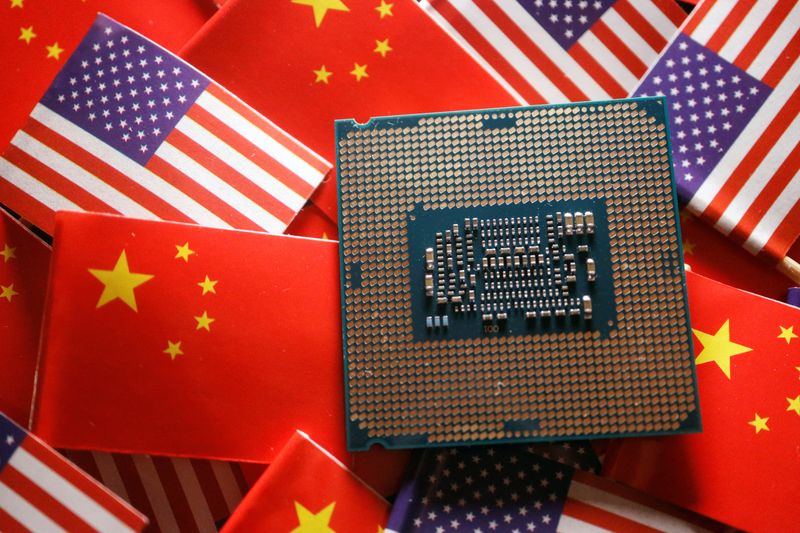By David Shepardson and Stephen Nellis
WASHINGTON (Reuters) -U.S. chip company executives met with top Biden administration officials on Monday to discuss China policy, the State Department and sources said, as the most powerful semiconductor lobby group urged a halt to more curbs under consideration.
Secretary of State Antony Blinken talked with chip company chief executives about the industry and supply chains after his recent trip to China, a department spokesperson told reporters.
Commerce Secretary Gina Raimondo, National Economic Council director Lael Brainard and National Security Council director Jake Sullivan were among other government officials meeting with Intel (NASDAQ:INTC), Qualcomm (NASDAQ:QCOM) and Nvidia (NASDAQ:NVDA), a source familiar with the meetings told Reuters.
The chip industry is keen to protect its profits in China as the Biden administration considers another round of restrictions on chip exports to China. Last year, China accounted for $180 billion in semiconductor purchases, more than a third the worldwide total of $555.9 billion and the largest single market, according to Semiconductor Industry Association (SIA).
Blinken sought "to share his perspective on the industry and on supply chain issues, especially after his recent visit to China" and "to hear directly from those companies about how they see supply chain issues, about how they see doing business in China," State Department spokesperson Matthew Miller said at a press briefing.
Discussions with government officials also included speeding up disbursement of government money put aside for semiconductor firms in the CHIPS Act and making sure U.S. policy does not shut the chip firms out of the lucrative Chinese market, a second source familiar with the matter said.
Commerce's Raimondo is overseeing the $39 billion CHIPS Act semiconductor manufacturing subsidy program approved by Congress last year. The law also created a 25% investment tax credit for building chip plants, estimated to be worth $24 billion.
The U.S. government is also focused on China's access to the most sophisticated artificial intelligence chips, the source added, saying Washington appears close to tightening the rules around how much computing speed such chips could have but have not yet picked a specific threshold.
Earlier on Monday, the U.S.-based SIA called on the Biden administration to "refrain from further restrictions" on chip sales to China and urged the administration to allow "the industry to have continued access to the China market, the world’s largest commercial market for commodity semiconductors."
The Biden administration is considering updating a sweeping set of rules imposed in October to hobble China's chip industry and a new executive order restricting some outbound investment.
"Our actions have been carefully tailored to focus on technology with national security implications, and designed to ensure that U.S. and allied technologies are not used to undermine our national security," a White House National Security Council spokesperson said.
Not every official was expected to meet with every company, said the initial source, who spoke on condition of anonymity.
The Commerce Department and White House declined to comment on any potential discussions.
The meetings come after China recently moved to restrict exports of raw materials such as gallium and germanium that are used in making chips, something the department spokesman said Blinken discussed in CEO conversations.
Nvidia, Qualcomm and Intel have crucial sales riding on China. Qualcomm is the only company with a license from U.S. regulators to sell mobile phone chips to Huawei Technology Co Ltd.
Nvidia is selling an AI chip tweaked for the Chinese market that is already gaining traction among major Chinese firms, and Intel Chief Executive Pat Gelsinger last week traveled to China to announce its own AI chip offering in China.
